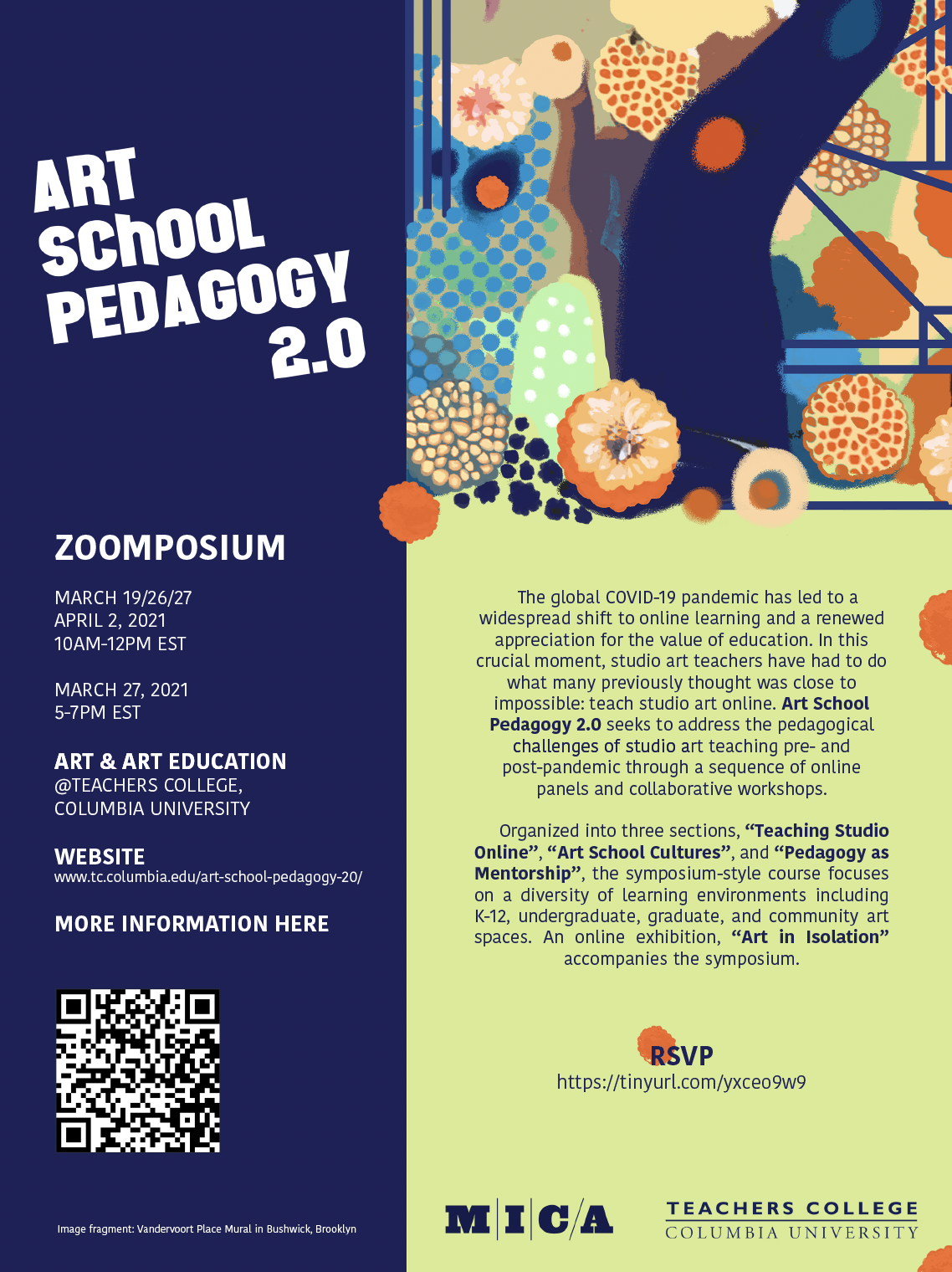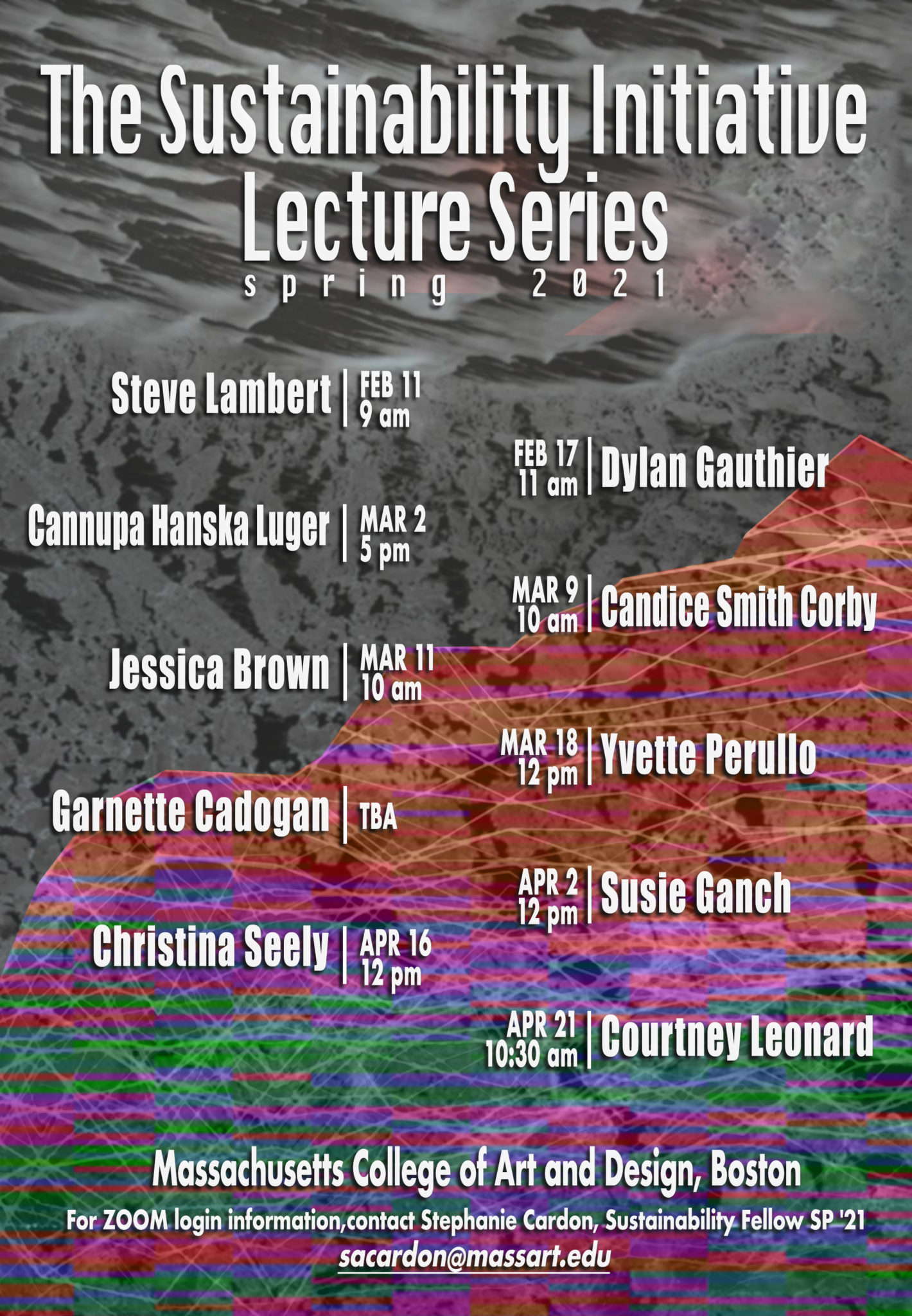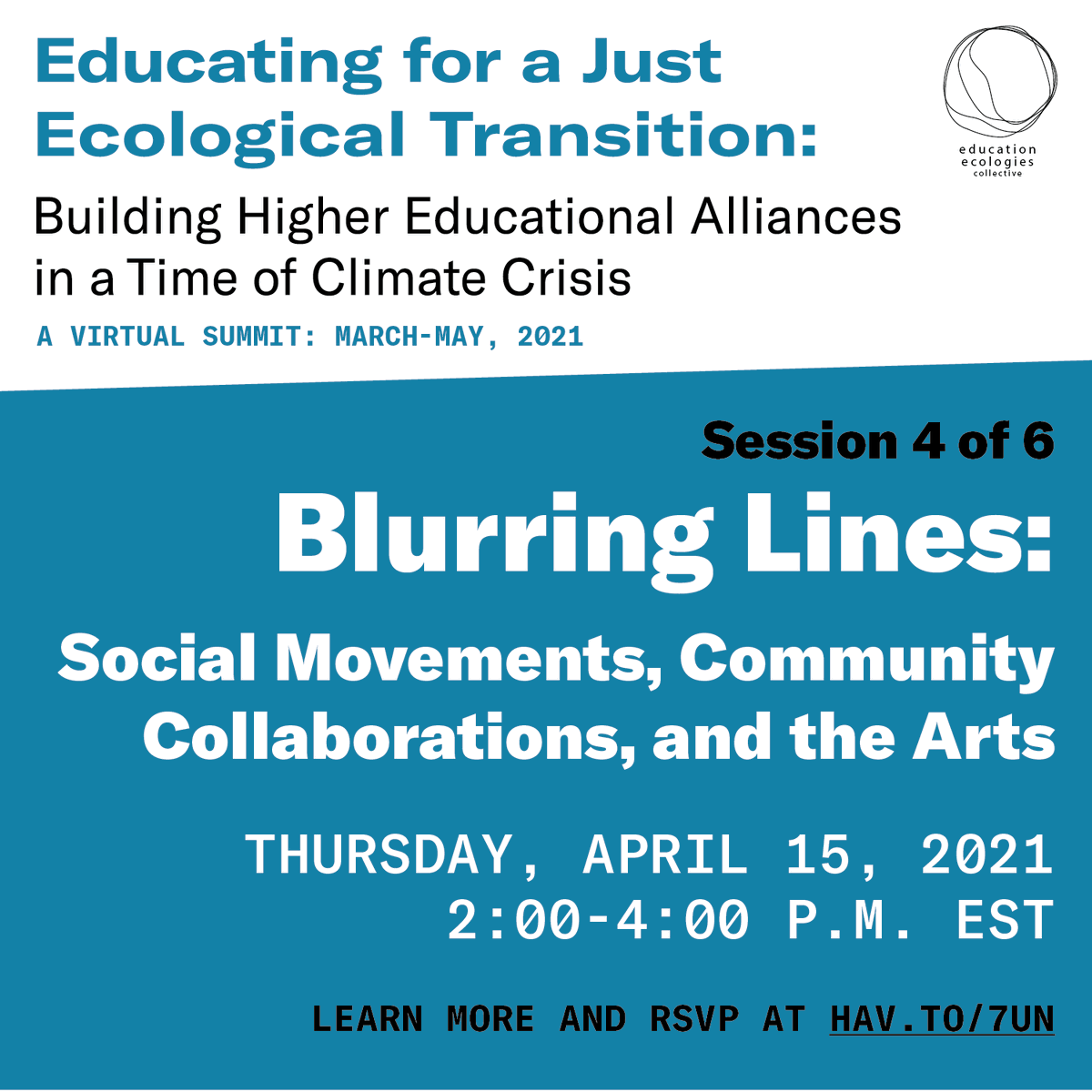As an instructor and facilitator, I work to promote a student-centered classroom environment, one in which co-learning and co-operation are central. It is my philosophy that students should share time with guest speakers and instructors as authorities in the classroom. Knowing that students come to class with their own knowledge, expertise, and interests, part of my role as a teacher is to help them become aware of their natural intelligences by taking an interest in their interests, and finding commonalities between our creative practices. I see each class as a collaborative project, the classroom as a shared studio and sometimes social sculpture, and students as collaborators and co-creators of the class.
As both an artist and an educator I am as interested in the modalities of the vernacular, the open source, platform cooperativism, DIY and critical making, and strategies where innovations in technology and media create new opportunities for making together across traditional disciplinary boundaries. I have taught classes that blend both the theory and production of emerging media, as well as video and digital media, 3d fabrication, sculpture, systems and cybernetics, time-based practices, internet art and web design, and traditional studio art (sculpture, performance, and installation). While each semester naturally plays out differently, my go-to approach is to work to develop a strong class culture that embraces openness and sharing early in the semester through group work, field trips, student sharing of work that speaks to them personally, and other such techniques. Drawing on my own creative practice, I teach art, and media as connectors between otherwise isolated disciplines. Drawing, painting, sculpture, and materials studies teach critical thinking and problem solving skills that can enrich a student’s life and can be applied to numerous fields outside the art industry. The emerging media arts extend this craft to the digital realm, where it crosses with issues of policy and protocol/control, extractive economies, and To paraphrase Ted Nelson, whose “Computer Lib/Dream Machines” expressed the need to learn computer programming to have a hand in the control structures that make our world, it is so crucial today that students learn how to think and write critically while developing the tools necessary to be able to express themselves in new technological and techno-social idioms — be they code, interactive media, social media, digital design, animation, video or game programming.
Art holds the power to make visible the unseen or under-acknowledged. For students, an arts education is also a critical approach to making and reconstructing the world with their own hands and from their own perspective. I encourage students to think beyond disciplines, to explore outside their comfort zones, and lead by sharing examples from artists who make personal and community empowerment central to their creative practices.
Recent Courses
Haverford College, Department of Environmental Studies2025/2026
ENVS 2027A, Art, Environment, Activism
ENVS 203, Environmental Humanities: Stories of Justice and Injustice
ENVS 204, Place, People, and Collaborative Research in Environmental Studie
Hunter College, Department of Film and Media
2025/2026
Ecoacoustics Sound Lab: Deep listening, place, and multispecies soundscapes in a changing climate
This immersive weekend workshop invites students to explore ecoacoustics—the study of environmental sounds within ecosystems—and deep listening practices to engage with the layered soundscapes of multispecies environments in the context of climate change. Designed for those interested in the intersections of sound art, environmental studies, and multispecies ethnography, this course emphasizes field-based learning and creative experimentation in sound recording and composition. The course will focus on capturing, analyzing, and interpreting environmental soundscapes using a variety of tools, including hydrophones, parabolic microphones, and other recording devices. By the end of the course, students will have developed a small portfolio of sound-based projects that weave scientific insight with creative expression. Whether their interests lie in sound art, ecological research, or environmental activism, participants will gain the skills and inspiration to create resonant work that amplifies the voices of the natural world in times of ecological crisis.
Massachusetts College of Art and Design (Undergraduate / Studio Foundation)
Spring 2021
Time
Time-based work is an important element of contemporary fine art and design and is fundamental to all art and design studio majors. Working in a wide range of media, students are introduced to basic concepts of art and design in time. Students will develop an understanding of temporal concerns across a wide range of time-based work including narrative, performative, spatial, tactile, and digital approaches. Assignments direct students in creating works that utilize attributes of time and movement; elements of serial, sequential, and narrative ordering; still and moving image production and editing; sound and image relations; and narrative and non-narrative approaches. Students will complete a final independent project in a time-based media of their choice. They will be introduced to the fundamental strategies used in art and design fields to conceptualize, produce, and present an independently conceived project.
Section Descriptions:
Time and the River – Water as Medium and Timekeeper
Water is life. At the intersection of the poetic and the pragmatic, this course takes water as a medium and a constantly moving force. Drawing on time-based representations of climate change, ecological crises, and environmental systems in contemporary and recent art (from film by Land Artists to Eco-Art to contemporary water-based practices by artist like Torkwase Dyson, Tavares Strachan, and Mary Mattingly), this course will invite multidisciplinary reflections on local waterways as subject, muse, and steady guide. Fusing multi-media art practice in 2d and 3d with experimental documentary and ethnography, this course will also encounter water sovereignty, in conflict and as a site of resistance, from Standing Rock to Flint.
Public/Private: Media and Technology in the Time of COVID-19
This course will address the breakdown of private and public space through distributed technologies, social media, online-ness, with a particular eye to the ways in which the COVID-19 global pandemic is accelerating our use of these forms even as our relationship to the private, self, and public, collective is blurred. How to make work that connects us while we are forced to be apart? How to distribute the time-based work we make in a variety of media – from immersive cinema, AR and VR, animation, graphic art, text and sound practices, algorithmic/programmatic and generative art, to online performance and hybrid forms – through channels that are rapidly emerging as the centers of art production and consumption? In addition to brave excursions into online spaces, we will read texts on subjectivity, identity, emerging media, and the limits and challenges of working with art, media, and technology
The New School / Parsons School of Design (Undergraduate)
Plastic! Waste, Design, Entanglement and the World’s Most Formidable Substance - 7498 - University Wide Lecture Course (ULEC), Fall 2019
This course tackles the wicked problem of the proliferation of plastics through engaged lectures coupled with small group discussion and critical making assignments that investigate issues in the histories, material cultures, and global economies of the world’s most formidable substance. Plastic is an ubiquitous fixture of our modern life, making up key components in everything from cellphones and computers to household furniture, automobiles, airplanes, effective prosthetics and medical aids, and of course, the packaging for everything else. A boon to industry, plastics have allowed us to move things (and ourselves) farther, cheaper, and faster; retain food freshness longer; or create entirely new categories of single-use consumer goods. Yet, we are becoming increasingly aware that the production of plastic has given way to the crisis of plastic. Over 300 tons of plastic is produced globally each year, and of this only a small amount is recycled. The rest ends up in landfills, polluting fields, alleys, and roadsides, or breaking down into smaller and smaller plastic particles in our waterways and oceans. These are ingested by fish and inevitably find their way up the food chain and onto our dinner plates. Toxicity from improperly disposed-of consumer grade plastics has been blamed for everything from lower fertility rates in humans to massive species die-offs in bees and other insects. By some accounts, plastic is in all of us. What alternatives are there to this collapse of global ecosystems and the ascendancy of the plastisphere?” How might we as artists, designers, and thinkers confront the plastic epidemic and design tools that make use of and/or counteract its ubiquitousness? The course will attempt to locate a “politics of plastics” that can contend both with specific sites of pollution and its status as an enabler of certain forms of global commerce and trade. Always looking to the future, the course will entertain solutions with workshops to produce sustainable bioplastics, visits to New York City’s recycling infrastructure, and projects created within the “precious plastics” lab at Parsons--part of a global movement that aims to massively rework the way we value recyclables. We will also discuss future research and design opportunities, contemporary art that interfaces with the “plastisphere,” and knowledge gaps in our understanding. Drawing on cutting edge research, visiting lecturers, teaching assistants, and the course instructor will give lectures, assign texts, and lead discussion groups on plastic as it intersects with disciplines of art, urban planning and design, and global and environmental studies. [This ULEC is in category 1, Tools for Social Change.]
Liquid Cities: Reimagining Urban Waterfronts and Waterways – 3428 – ULEC 2280
Water has always been the lifeblood of the city. The 21st century, with its emerging threats of climate change and a rising sea level, presents most if not all of our great urban centers with unprecedented questions about their sustainability and survival; as a result, urban waterworks, waterfronts, and waterways have all assumed a critical importance. Drawing from four interdisciplinary New School programs–Global Studies, Urban Studies, Urban Design, and Environmental Studies–this course investigates the complex connection of cities and water systems, with a particular focus on the way the “edge” of the waterfrontcity can be both a boundary and a center, essential for commerce, transport, development, and ecological resilience. New School faculty and visiting lecturers will take an interdisciplinary approach to local, regional and global topics and initiatives, including the strengths and weaknesses of New York City’s water and sewer systems and efforts to clean its most contaminated waterways, the politics of land reclamation and waterfront development here and abroad, containerization and the global geography of transport, the representation of the waterfront in art and media, and the social and political impact of climate change and natural disasters. Field trips and collaborative projects will be required elements of this course.
Int Sem 2: Sys & Strategies – 2720 – PUFY 1011 – Spring Semesters
How do we experience design? What does it mean to engage in a community — in a city, with a group, in shaping an organization, in reconfiguring a service — as a designer? Under this theme students will begin to unearth the complex systems that connect design to behaviors. In Integrative Seminar 2, we will expand the skills acquired in Integrative Seminar 1 through the introduction of a wide variety of research methods — both digital and analog — and in projects that are shared with Integrative Studio 2. We will use digital tools and online platforms along with fieldwork to extend the research and creative problem-solving undertaken in class. Using methods such as interviews, visual research, online sources, libraries, experiments, and firsthand observation, we will explore the multiple ways in which a topic can be researched. This course offers options that align with the research approaches used within the different schools at Parsons.
Sustainable Systems – Parsons First Year, ADHT – Spring & Fall Semesters, 2017-Present
This course provides an introduction to the systems inherent in adaptive, resilient design practices. What are the challenges and opportunities for designers when they create products, systems, and services that are socially, environmentally and economically sustainable? This course begins to address that question. The curriculum is structured around four major themes; Climate Change, Materials, Energy, and Water. These interrelated themes frame students’ observations as they study real conditions that are both local and accessible and inclass discussions teach students to translate research into creative solutions. The class activities combine field trips, lectures, studiobased workshops, lab experiments and seminars. Both the fieldwork and applied research methods are then developed into creative works that support diversity, adaptability and resilience in the face of ever changing conditions. All currently open seats for Fall 2017 have been reserved for BBA Strategic Design & Management students.
Hunter College, Department of Film and Media Studies, City University of New York (Graduate)
History and Theory of Emerging Media, IMA 702.00
The term Emerging Media has been used to describe many themes, processes, trends and media and cultural developments that have arisen in our society over the past hundred-odd years. This course will introduce – and ask students to analyze and discuss – the central themes and debates in emerging media studies by looking at the key components of computer and/or digital culture (interactivity, cybernetics, hypertexts, memes, viral video, networks, databases) and placing them within a historical context in order to unpack and explain how these developments continue to construct the world around us. A particular stress will be placed on unpacking underrepresented and avant-garde histories of media/art, drawing on global traditions and on diverse communities here in the U.S.
In studying Emerging Media, we will rely heavily on examples of new forms of expression in art, literature and general culture as well as computer science by revisiting key digital artworks and new media artifacts since the turn of the last century. By nature of the term emergence, this is a volatile field of study. The course itself will be reactive and predictive – with student’s assistance we will continue to orient the course around the new, the cutting-edge, the groundbreaking, and the experimental in media studies. Additional contemporary texts and current examples will be brought in over the course of the semester to supplement canonical readings. We will look at examples including such recent techno-social forms as memes, glitch art, online anonymity, data, surfing clubs, drones, electronic surveillance, affect, multitasking, trolls, the “robotic moment,” cyber libertarianism, etc., with an eye toward understanding these forms so that we can better approach and potentially harness (or challenge) them within our own artistic and media-based practices. Students are highly encouraged to make use of resources in the city around them, to visit, study and report back on new media art or innovative technologies they may find in what is in many ways still the capital of emerging media arts.
Past Semesters
Parsons School of Design (Undergraduate)PUFY 1100 – Sustainable Systems
Int Sem 2: Sys & Strategies – 2720 – PUFY 1011
Hunter College, Department of Film and Media Studies, City University of New York (Graduate & Undergraduate)
Emerging Media 1
History and Theory of New Media
Graduate Thesis Seminar
Understanding New Media
Media+Policy+Rights in a Digital Age
Web Design Projects
Web Production 1
Film and Media in a Digital Age
Introduction to Media Studies
SUNY Old Westbury, Department of American Studies
New Media Newsroom
Intro to Media & Journalism
History of Mass Media
Selected Class Lectures/Visiting Artist Talks
advanced workshop in artistic practice and transdisciplinary research, MIT ACT, Gediminas Urbonas and Lars Bang Larsen (2017)Sound, Cooper Union, Zach Poff (2017)
Cities, Art and Catastrophe, Parsons School of Design / The New School (2017)
New Media Junior Seminar, SUNY Purchase, Brooke Singer (2016)
MFA Transdisciplinary Design, Parsons School of Design / The New School, MFA, John Roach, (2016)
Art and Environment, Parsons, The New School, MFA, Radhika Subramaniam (2016)
Digital Design, NYU Tisch School of the Arts (undergrad. – Jeff Stark) (2015)
Back to the Land and DIY Environmentalism, Haverford College, Haverford, PA, Joshua Moses (2015)
MFA Critique: Guest Critic, DiAP, City College, New York (2015)
Irons in the Fire, Columbus College of Art and Design (undergrad. – James Voorhies) (2010)
Social Practice, California College of the Arts, Sam Gould, (2010)
Recent Speaking / Artist Talks


